|
|
|
Sort Order |
|
|
|
Items / Page
|
|
|
|
|
|
|
| Srl | Item |
| 1 |
ID:
160353
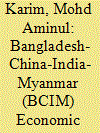

|
|
|
|
|
| Summary/Abstract |
The Belt and Road Initiative (BRI), ostensibly a connectivity and developmental
program, was launched by the Chinese President Xi Jinping with the primary
objective of connecting the common people in Asia through trade, infrastructure
and culture. The initiative is designed to enhance connectivity in areas such as trade,
infrastructure, investment, capital and people. That said, since its inception, the
project seems to confront certain hurdles such as regional geopolitical complexities
and launching of other alternative proposals that tend to hamper its progress. As
part of the BRI, the BCIM–EC proposes to connect eastern China with South Asia
that will also ultimately connect Southeast Asia through different modes for better
economic and cultural connectivity. This paper attempts to evaluate the challenges
and opportunities of the BCIM–EC project in the context of South and Southeast
Asian nations. The paper concludes that the challenges are rather overriding.
|
|
|
|
|
|
|
|
|
|
|
|
|
|
|
|
| 2 |
ID:
145487
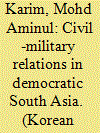

|
|
|
|
|
| Summary/Abstract |
The aim of this paper is to conceptualize a comparative framework on civil-military relations (CMR), at both political and strategic levels, in the context of major South Asian states such as India, Pakistan, and Bangladesh. There are complexities involved in framing and explaining power relations between political/ bureaucratic and military elites in these countries. Methodology used in this paper is basically content analysis, interviews, and observations made, and inferences drawn by the author himself, given his professional experience. The paper concludes there are both similarities and dissimilarities in such relations between democratic and quasidemocratic or between liberal and illiberal polities.
|
|
|
|
|
|
|
|
|
|
|
|
|
|
|
|
| 3 |
ID:
104184


|
|
|
| 4 |
ID:
142742


|
|
|
|
|
| Summary/Abstract |
South Asia as a region has been facing the challenges of transnational terrorism and extremism – be it religious fundamentalism, separatist or left-wing – for more than three decades. The irony, however, is that escalation of terrorism in South Asia along with its political division has made it easier-said-than-done to have meaningful regional collaboration on the issue. The purpose of this paper is to find out the factors, which hinder effective counter-terrorism cooperation in South Asia. Based on the “Regional Security Complex Theory (RSCT)”, this paper argues that the security structure in South Asia is uniquely characterised by historical mistrust among its members, specially its bipolar conflictual power structure. It further argues that the nature of conflict formation in South Asia has facilitated the rise and sustenance of transnational terrorism. Finally, it contends that extreme reliance on the zero-sum notion of security by South Asian states prevents the South Asian Association for Regional Cooperation (SAARC) to emerge as an effective counter-terrorism organisation on a regional basis.
|
|
|
|
|
|
|
|
|
|
|
|
|
|
|
|
| 5 |
ID:
128017
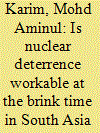

|
|
|
|
|
| Publication |
2014.
|
| Summary/Abstract |
The aim of this paper is to analyze the likely reactions of the nuclear actors, mainly
in South Asia, in any prospective tensed scenario. Nuclear deterrence is generally
being sustained in South Asia since 1971 but a turn of events might suddenly
transform this state to a degree that could prompt the decision-makers to take
hasty and irrational decisions. This paper examines the doctrines, command and
control, safety measures, nuclear terrorism, and above all the strategic stability in
South Asia in order to determine the probability of reaching the brink time. The
paper concludes that even a small-group provocative act may initiate a conventional
showdown to start with, maybe centering on Kashmir or other sensitive issues; it
may then possibly compel the actors to consider the use of nukes.
|
|
|
|
|
|
|
|
|
|
|
|
|
|
|
|
| 6 |
ID:
095939


|
|
|
| 7 |
ID:
143604


|
|
|
|
|
| Summary/Abstract |
Increases in military spending have a big impact on the socioeconomic conditions in any country. However, there is no consensus as to whether the rising military expenditure is beneficial or detrimental to economic growth. The present study chose China as a case study to empirically examine a complex relationship between military expenditure and economic development. The findings from the Johansen cointegration test indicated that there existed a long-run relationship between China’s military spending and economic growth. Furthermore, the Granger causality test detected a unidirectional causality from economic development to military expenditure. These results were further confirmed by the findings from the impulse response function. This means that China represents an example of a developing economy where the size of military expenditure expands in the process of economic transformation.
|
|
|
|
|
|
|
|
|
|
|
|
|
|
|
|
| 8 |
ID:
064445
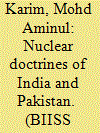

|
|
|
| 9 |
ID:
112746
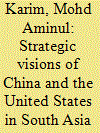

|
|
|
|
|
| Publication |
2012.
|
| Summary/Abstract |
China and the United States are the greatest strategic powers of the world today, where
China is rising but the United States still remains predominant. Both have their grand
strategic visions to shape and manage the world or regional political and security
architecture. South Asia, being located in a critical and important geographical area,
with players such as India, Pakistan, and others, is factored in their visions. It gives
rise to a different combination of alignments and orientations of the states of South
Asia and beyond. A kind of power game, along with its tangible manifestations, also
seems conspicuous. This paper attempts to develop a broad framework of such
developments, along with ramifications, both in place and projected, in the political
power games of the relevant actors in South Asia.
|
|
|
|
|
|
|
|
|
|
|
|
|
|
|
|
| 10 |
ID:
099681
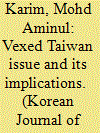

|
|
|
|
|
| Publication |
2010.
|
| Summary/Abstract |
Taiwan is a vexed issue, and having no definite sovereignty status at the inter-state level, it carries the potential for conflagration. There is palpably a contradiction between its de jure and de facto status. Contradiction is also discernible in realizing the right brand of nationalism and the question of justice in adopting the appropriate hierarchical mode of governance. As such, there is a need to rethink its status and also the surrounding security architecture. The actors concerned may have to confront high stakes if its status quo is changed. The "one China" policy is accepted by all-but its varying interpretations and ambiguities in different official documents and pronouncements, made mostly keeping in view the geopolitical and nationalist compulsions, give rise to concern. It has turned out to be a flashpoint whose political status will, hopefully, be finally decided peacefully in a mutually accepted agreement through dialogue and confidence-building measures. This paper examines the present status of Taiwan and the suggested ways forward for its final settlement, keeping in focus the security, political and economic realities-both in the People's Republic of China and Taiwan, as well as the surrounding region. There is a suggestion for a people-centric, like people being masters of their own destiny (people-first) solution-maybe in order to preclude the geopolitical complexities.
|
|
|
|
|
|
|
|
|
|
|
|
|
|
|
|
|
|
|
|
|